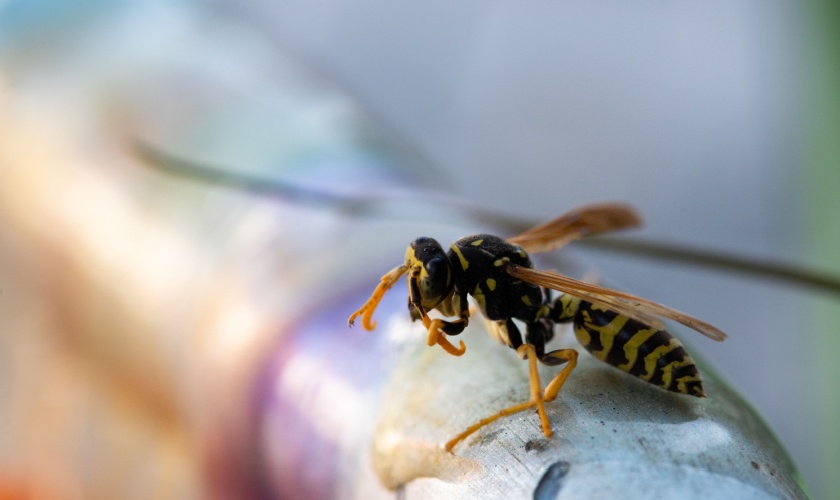Yellow jackets are among the most aggressive and territorial stinging insects in the Morgan Hill area. Understanding what attracts these pests to your property is the first step in preventing unwanted encounters. If you’ve noticed an increase in yellow jacket activity around your Morgan Hill home, several factors may be drawing them to your backyard.
Food Sources That Attract Yellow Jackets
Yellow jackets are opportunistic feeders with diverse appetites that change throughout the season:
Protein Sources (Spring and Early Summer)
During the colony development phase, yellow jackets actively hunt for protein to feed developing larvae:
- Other insects (especially caterpillars and flies)
- Spiders and small invertebrates
- Pet food left outdoors
- Uncovered garbage containing meat scraps
- Outdoor cooking areas with meat residues
Morgan Hill’s diverse ecosystem provides abundant hunting grounds for yellow jackets, but properties with insect populations concentrated around gardens or flowering plants become particularly attractive targets.
Sweets and Carbohydrates (Late Summer and Fall)
As colonies mature and food preferences shift, yellow jackets become increasingly attracted to:
- Overripe fruit from backyard fruit trees (especially popular in Morgan Hill’s many home orchards)
- Spilled sweet beverages from outdoor dining
- Open garbage containers with sugary food waste
- Hummingbird feeders with sugar water
- Sweet-scented flowers and ornamental plants
This late-season preference for sweets explains why yellow jackets become particularly problematic around outdoor dining spaces as summer progresses into fall.
Nesting Site Attractions
Yellow jackets seek specific environmental conditions when establishing nests:
For Underground Nesters
The Western yellow jacket (Vespula pensylvanica), Morgan Hill’s most common species, prefers to nest underground in:
- Abandoned rodent burrows
- Areas with loose, dry soil
- Locations with southern exposure
- Protected areas along foundations, fence lines, and garden edges
- Areas with minimal soil disturbance
Properties with ideal soil conditions and abundant rodent populations inadvertently provide perfect yellow jacket nesting habitat.
For Aerial Nesters
Other yellow jacket species that build aerial nests are attracted to:
- Protected spaces under eaves and overhangs
- Densely vegetated areas providing concealment
- Undisturbed storage areas like sheds and garages
- Tree hollows and thick shrubs
- Areas with access to building materials like weathered wood
Water Sources
Like all insects, yellow jackets require water. Morgan Hill properties with accessible water sources attract foraging workers, including:
- Dripping outdoor faucets
- Bird baths and pet water dishes
- Poorly drained areas with standing water
- Swimming pools and decorative ponds
- Irrigation system leaks
Yard Features That May Attract Yellow Jackets
Several common landscape elements in Morgan Hill yards can inadvertently create yellow jacket-friendly environments:
- Flowering plants: While important for beneficial pollinators, certain flowering plants particularly attract yellow jackets. These include sweet-smelling varieties and those that bloom late in the season.
- Fruit trees: Morgan Hill’s climate allows for excellent fruit production, but fallen fruit quickly becomes a yellow jacket magnet.
- Dense ground covers: Thick vegetation provides protected travel corridors and hunting grounds for yellow jackets.
- Mulched areas: Organic mulches create insect-rich environments that provide hunting opportunities.
- Wood piles and brush: These provide both nesting materials and sheltered areas for nest construction.
Prevention Strategies
Understanding these attractants allows Morgan Hill homeowners to implement effective preventative measures:
- Promptly harvest ripe fruit and remove fallen fruit from the ground
- Keep outdoor eating areas clean and quickly clean spills
- Use garbage cans with tight-fitting lids
- Repair leaky faucets and irrigation systems
- Consider professional yellow jacket prevention services
At Citra Pest Control, we offer comprehensive yellow jacket management programs specifically designed for Morgan Hill properties. Our technicians can identify and address the specific attractants on your property while implementing targeted treatments to prevent yellow jacket establishment.
By minimizing these attractants, you can significantly reduce the likelihood of yellow jackets selecting your backyard as their preferred territory.

